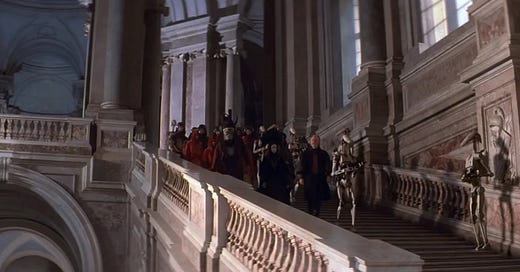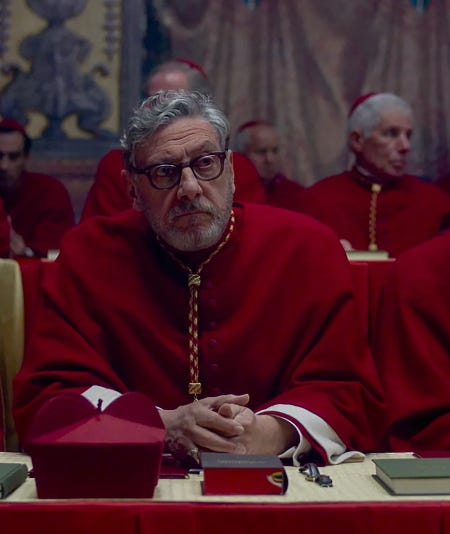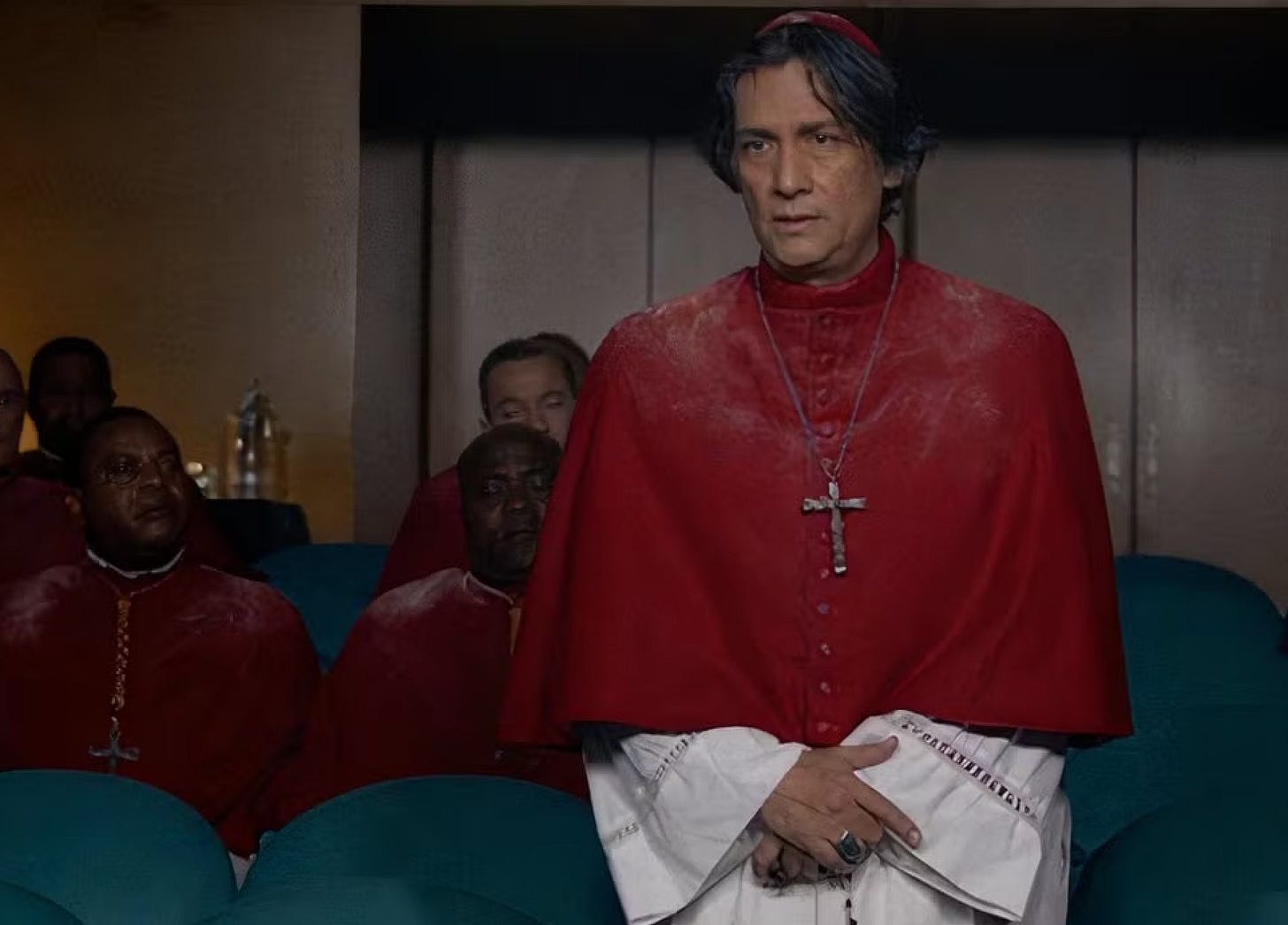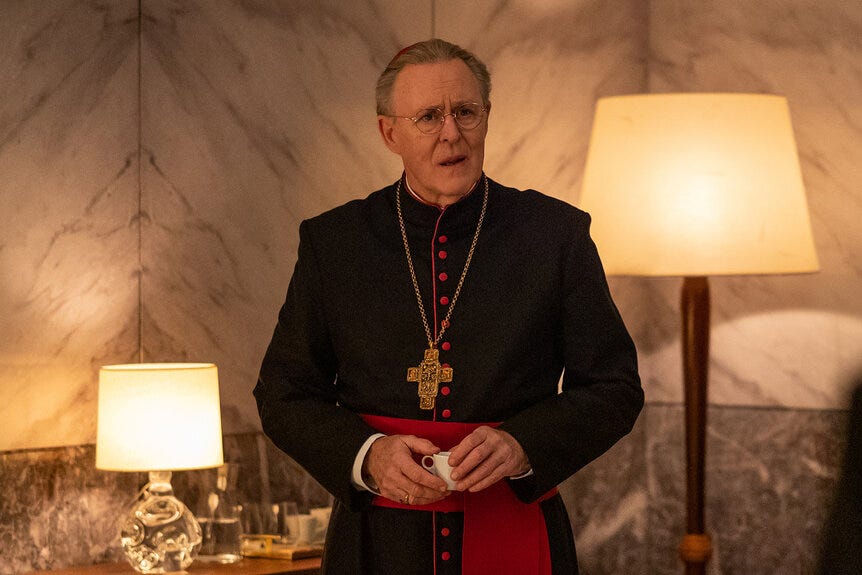NOTE: This piece does include spoilers for the film Conclave.
Introduction:
After a year of watching films centered on female protagonists, I finally watched a film for the guys. On Tuesday, November 26, I watched Edward Berger’s film Conclave about a fictional papal conclave. Of course, the vast majority of this cast is male because they have to be. Although a few nuns make prominent performances in the film — especially Sister Agnes played by Isabella Rossellini — we are mostly following scenes of male characters as opposed to the female-dominated films that I watched earlier this year: Inside Out 2, The Substance, and Anora. I have reviewed both Inside Out 2 and The Substance here on Substack.

If you loved the Star Wars prequels, then you’ll love Conclave! We have important people politicking in front of green screens. Walk and talk! But instead of planting Senator Palpatine as Emperor, we are getting a new pope! The film Conclave does differ in that it is not tricking kids into seeing it with lightsabers and action! This film will bore a little kid, but at least it is honest about it. It makes sense that this film is doing so well with Boomers.
To get serious, before I finally watched Conclave upon its release on Apple TV, I knew that it had fomented controversy in the Catholic and conservative worlds. Bishop Robert Barron of Winona-Rochester in Minnesota had critiqued it as had conservative commentator Ben Shapiro (Jewish — not Catholic). They largely believed that the film was too “woke”, a castigation upon which Shapiro seemingly relies whenever he reviews films nowadays.

Much of this criticism came from the twist ending in which the cardinals ultimately elect Vincent Cardinal Benitez, an archbishop whom the late pope had secretly elevated to the College of Cardinals before he died. The twist is not necessarily that they appointed the clandestine archbishop of Kabul, Afghanistan. Rather, the twist that has engendered so much criticism lies in the fact that Vincent Benitez, who ultimately becomes Pope Innocent XIV, is revealed to be intersex in the final minutes of the film.
I understand the conservative knee-jerk repulsion of this twist about the new fictional pope. A lambasting of the film makes a perfect segment on The Ben Shapiro Show as it actually did. The topic falls perfectly in the COUNTER CULTURE WAR against WOKE LGBTQ ACTIVISTS! To me, even if I have sympathies toward the conservative sides of these culture wars, they seem so … 2021 and 2022. They’re so first term of Ron DeSantis’s tenure as Florida governor before his re-election in November 2022 and especially before the launch of his presidential campaign in May 2023. Ben Shapiro needs to go back to a Glenn Youngkin rally in Loudoun County, Virginia, in October 2021.
Moreover, I see conservative principles in Conclave despite the twist ending, and I see it as cheap and hackneyed to denigrate the entire movie based on the intersex plot point. Now, when I say “conservative”, I mean little c conservative. This is not a conservatism based in Turning Points USA talking points here in the United States. The Catholic Church is little c catholic, an adjective that just means “universal”. Pope Francis represents 1.3 billion Catholics across all six inhabited continents. The ideological considerations of the Catholic Church dwarf whatever ephemeral cultural battles we have here in the United States.
The film Conclave does not tell the story of an intersex cardinal who becomes pope. Instead, it tells the story of Ralph Fiennes’s character, the conflicted dean of the College of Cardinals. With that position, he has the responsibility to organize and manage the conclave. As a conservative Catholic, I did not get the sense that the director Edward Berger was trying to foist his LEFTIST HOLLYWOOD DOGMAS onto me. In actuality, I saw Conclave as a story lambasting the sins of gossip and scandal corrupting the actions of the dean of the College. If Cardinal Lawrence had not indulged in his temptations to snoop around, then none of the chaos would have ensued. At the very least, he could have mitigated the chaos. I concede that a degree of chaos will always manifest in a situation with such high stakes as electing the new pope with so many competing candidates and ideologies within the Church.
The Conservative Outrage against Conclave
Background of Bishop Barron
Before I delve into my more specific thoughts on Conclave, I want to more thoroughly analyze some of the conservative critiques of the film. I will begin with the takes from Bishop Robert Barron. He has served as the bishop of the Diocese of Winona-Rochester in Minnesota since Pope Francis appointed him to the post on June 2, 2022 — but he began his career as a bishop as an auxiliary bishop in the Archdiocese of Los Angeles, where he served from September 2015 to June 2022. I first remember seeing Bishop Robert Barron when Ben Shapiro interviewed him on December 16, 2018.
Since then, he has appeared all over the Ben Shapiro Cinematic Universe as both Jordan Peterson and Lex Fridman have interviewed him on their podcasts. Amid the pandemic, when many people could not or did not attend church, Bishop Barron found great success online via Twitter, YouTube, and his own podcast. To give some context, he has 1.8 million subscribers on his YouTube channel and 311 thousand followers on Twitter.
On the surface, when you look at Bishop Barron’s Wikipedia page and see “Bishop of Winona-Rochester”, you might see him as some humble priest out of small-town Minnesota. I can think of another priest on social media who has this sort of distinction. Father Mike Schmitz — the creator of the popular The Bible in a Year podcast — serves in the Diocese of Duluth in Minnesota as well (although Father Schmitz does not serve as a bishop). As for Bishop Barron, once I look beyond his post in Minnesota, it all makes sense. His tenure in the Archdiocese of Los Angeles likely influenced his predilection to evangelize on social media.
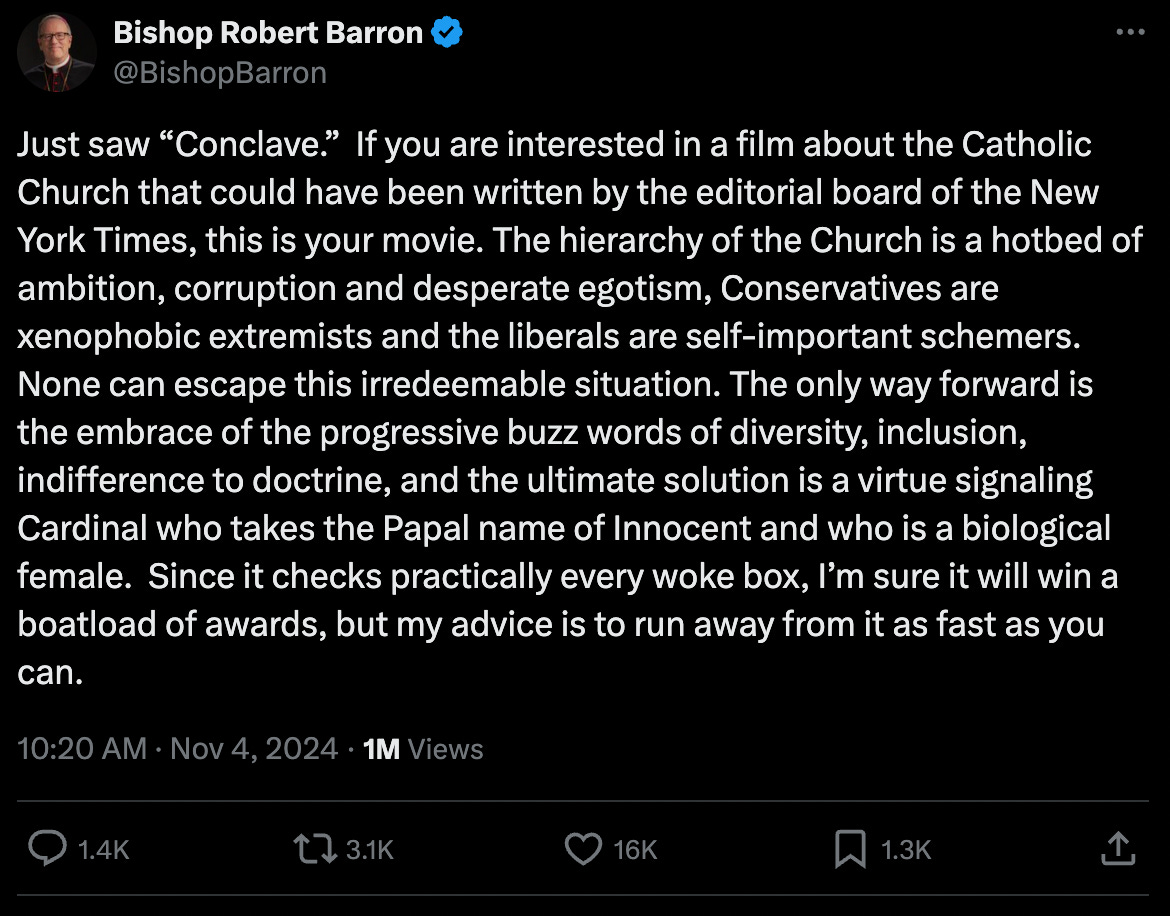
Bishop Barron’s Opinion on the Film
On November 4, Bishop Barron made the above tweet about the film Conclave. I saw this tweet before I actually watched this film. In fact, I would say that it spurred me to watch it even more because I wanted to see how “far” they went in Conclave. Why did it upset Bishop Barron so much? He makes flashy critiques, such as saying that the editorial board of The New York Times had written it. The conservatives are xenophobic? The liberals are the righteous ones? It checks every woke box?
Until I got to the twist at the very end of the film, I did not see the justification for the outrage, but the twist ultimately comes. As I have already written — right after the cardinals elect Vincent Cardinal Benitez — Benitez reveals to Lawrence about his status as an intersex person. Once the knowledge of that twist enters your mind, you might begin to retroactively change your opinion of everything that came earlier in the film. The twist changes the entire context and puts the plot in a new light. If you are a conservative seeking confirmation that woke Hollywood hates the Catholic Church, Christianity, and religion overall — then certain nuggets throughout the film will now reveal themselves as indications of that antipathy toward Catholics. You might have not really considered these plot points before the twist, but — by the end of the film — you do.

Focus on Liberal Cardinals
For one, the film mostly follows the liberal wing of the cardinalate as the dean of the conclave aligns himself with the more liberal cardinals. Stanley Tucci’s character Aldo Cardinal Bellini from an unidentified diocese in the United States probably has the most express liberal leanings out of any cardinal. Near the beginning of the film, when his allies suggest that he become pope, Bellini affirms that he wants to increase tolerance towards gay people and divorce within the church and expand the role of women. Once Bellini expresses these beliefs of his, even his liberal allies suggest that he does not mention the part about expanding the role of women in the Church.
These statements from Bellini come when the liberal cardinals are meeting to plot on how to take down Goffredo Cardinal Tedesco, played by Sergio Castellitto. Tedesco serves as a cardinal from Italy and represents the very conservative wing of the cardinalate. He wants to return to the expanded use of Latin in the Church and to the glorious days of an Italian pope. As he points out during a dinner with all of the cardinals, the Church has not had an Italian pope since John Paul I died in September 1978 after his extremely short papacy of 33 days. Tedesco also laments the days before the Second Vatican Council brought WOKENESS to the Catholic Church in 1965.
Focus on Sex Scandals
The film goes through a slew of candidates for the papacy, but many successively become invalidated from contention once scandals about them appear. When I tell you that the heart of the film’s plot surrounds Dean Lawrence discovering the scandals of these potential candidates, you might reasonably assume that these scandals involve child abuse as Hollywood does have an infatuation with the past child abuse in the Catholic Church. We can look at the 2015 film Spotlight about The Boston Globe journalists who valiantly uncovered child abuse in the Archdiocese of Boston. As one would expect, the Academy awarded Spotlight with Best Picture that year. Tucci even performs in that film as well. He played an attorney defending the victims of child abuse.
I personally believe that the child abuse cases serve as a cudgel for people opposed to religion to denigrate Catholicism. They wanted to denigrate the Church anyway, but the child abuse scandals provided them a convenient option. Of course, I am not condoning the actions of priests who abuse children. Those priests will burn in Hell, but they do not indicate a broader, macroscopic issue with the Church and its adherents.
Despite Hollywood’s obsession with child abuse in the Catholic Church, neither director Edward Berger nor screenwriter Peter Straughan of Conclave focuses on child abuse. Yes, one of the priests has a sex scandal, but it has nothing to do with pedophilia. The scandal comes to light when Joshua Cardinal Adeyemi of Nigeria is sailing to the papacy. British actor Lucian Msamati portrays Cardinal Adeyemi.
Cardinal Adeyemi had sex with a nun in Nigeria three decades prior. She gave birth to a son, who does not know the identities of his parents. Dean Lawrence unearths Adeyemi’s past because that nun had come from Nigeria to Vatican City to serve the conclave. Until then, the nun had never left Nigeria. A more Machiavellian papal candidate Joseph Cardinal Tremblay (John Lithgow) of Canada planted the nun to come to Vatican City to foment chaos and disruption at the expense of Adeyemi. Tremblay knew that Adeyemi was challenging him for the papacy, so Tremblay pursued immoral strategies to torpedo Adeyemi. His efforts found success as Adeyemi’s chances plummeted once the cardinals all witnessed an aggressive exchange between Adeyemi and the nun at their lunch.
I really do not see this lapse of Adeyemi’s as a cheap shot against the Catholic Church. This situation could realistically happen to a bishop, and I truly do not see it as a deeper political message. The only allusion to the child abuse scandals comes when Lawrence tells Adeyemi that he will not become pope because the cardinals do not want more sex scandals, but they do not get into any more detail beyond that brief statement.
In the real-life conclaves, as laypeople, we do not know the political machinations behind the scenes because of the intense confidentiality of the process. We do not know how much the dean will actually peruse the pasts of papal candidates, so Berger and Straughan must make assumptions. This sort of sin in the past seems like the sort of a part of a cardinal’s past that could invalidate his candidacy once the event comes to light.
Moreover, although these plot points may lean toward the left, I think that they only irk critics after the fact once they learn about the intersex twist.
Further Analysis of the Fictional Intersex Pope
I wish that Berger and Straughan had not included the twist at the end although they did not write the story. Peter Straughan adapted Conclave from a 2016 book written by Robert Harris of the same name. I oppose the twist for a few reasons, but my biggest reason is that it distracts from the rest of film, which is really great. The discussion of the film revolves more around a plot point introduced in the final minutes of the film rather than the vast majority of the film.
To give more specifics about the intersex status of the new pope, Vincent Cardinal Benitez has XX chromosomes as a woman would, but he went through life as a male. He admits to having a uterus and ovaries, so why did he live his whole life as a male? Benitez is not transgender as many conservative critics want to say. Rather, as a baby right after his birth, he presented as a baby boy. The film does not get into specifics about the appearance of his genitalia, but I would assume that he had more ambiguous genitalia. Nonetheless, he probably looked more like a boy, so — with the advice of the doctors — his parents probably chose to raise him as one.
We only know about his uterus and ovaries, and he did not discover that he had those internal female organs until he had an appendectomy as an adult. I still have doubts about the realistic nature of this situation, but I do not want to delve into the specifics of the appearance of genitalia in an intersex person. Regardless, it sounds as if Benitez assumed that he was male his entire life. He had no reason not to think so, and — if Benitez came from a poor village in Mexico — then the limited medical services and doctors might not have had the ability to discern the truth.
I do not have much knowledge about the subject, but I would assume that the situation gets clearer as a boy in this situation progresses through puberty. However, Benitez likely did not have a normal adolescence. He chose to become a priest as a young man, and — assuming that he followed the vow of celibacy — he would never have had intercourse with a woman to see possible dysfunction in his possibly male-appearing genitalia.
Of course, in the Catholic Church, only males can enter the priesthood — and only a confirmed Catholic male can rise to the papacy. With these requirements in mind, Benitez should neither be serving as a cardinal nor become pope. In many ways, the twist seems like a rug pull, and I do not know how realistic it is that Benitez would have risen so highly in the Catholic Church with the knowledge of his condition. When Benitez discovered that he had a uterus and ovaries, he informed the late pope, who wanted Benitez to remain as a priest and later elevated him to cardinal.
I do not know what the actual pope would have done in such a situation. Benitez had lived his life as a male and likely did not know about his female anatomy for the majority of his life. For centuries, it would likely be impossible for doctors or parents to know about a baby who is truly intersex. Only because of modern medicine did Benitez discover his uterus and ovaries. If Benitez and the Church had known about his condition from the beginning, then he likely could not have become a priest whereas — by the time that Benitez had discovered his anatomy — one could argue that it was “too late” to reverse his ordination.
If the pope had proclaimed that his ordination was invalid, then all the sacraments that Benitez had delivered as priest would become invalid. All the baptisms, confirmations, and weddings would be invalid. When he was serving as a bishop, all the ordinations of new priests would be invalid. Perhaps the pope acknowledged the harm of that cascading effect, and it is not worth for what some may see as a technicality. Again, Benitez was not a woman knowingly cross-dressing to deceptively become a priest.
The Real Antagonist of Conclave
Even after I got to the twist in the film, I did not see the members of the conservative ideological wing in the Catholic Church as the antagonists. Instead, the sin of gossip serves as the antagonist. Throughout the entire conclave, the temptation of gossip infects Dean Lawrence’s mind as he is investigating the pasts of the papal candidates, but I am going to use more specific terms related to gossip from the Catechism of the Catholic Church. The Catechism lays out the sins of detraction and calumny, which fall under the violations of the Eight Commandment: “You shall not bear false witness against your neighbor”.
Definitions of Detraction and Calumny
Both detraction and calumny count as “offenses against the truth”. The Catechism defines these sins as
Respect for the reputation of persons forbids every attitude and word likely to cause them unjust injury. He becomes guilty:
- of rash judgment who, even tacitly, assumes as true, without sufficient foundation, the moral fault of a neighbor;
- of detraction who, without objectively valid reason, discloses another's faults and failings to persons who did not know them;
- of calumny who, by remarks contrary to the truth, harms the reputation of others and gives occasion for false judgments concerning them.To avoid rash judgment, everyone should be careful to interpret insofar as possible his neighbor's thoughts, words, and deeds in a favorable way:
Every good Christian ought to be more ready to give a favorable interpretation to another's statement than to condemn it. But if he cannot do so, let him ask how the other understands it. and if the latter understands it badly, let the former correct him with love. If that does not suffice, let the Christian try all suitable ways to bring the other to a correct interpretation so that he may be saved.
Detraction and calumny destroy the reputation and honor of one's neighbor. Honor is the social witness given to human dignity, and everyone enjoys a natural right to the honor of his name and reputation and to respect. Thus, detraction and calumny offend against the virtues of justice and charity.
I really think that Dean Lawrence fails on all of these fronts.
Dean Lawrence’s Offenses Against the Truth
Investigation of Cardinal Tremblay: From the beginning of Conclave, Dean Lawrence is seeking gossip on papal candidates. I would assume that the dean of a conclave should play a more neutral role, but — right out of the gate — he is scheming with Cardinal Bellini on how to take down the conservative Cardinal Tedesco. To achieve this goal, the liberal cardinals try to coalesce behind Cardinal Bellini, but they must also supplant Cardinal Tremblay, the most political of all the cardinals. Cardinal Tedesco threatens the liberals from an ideological standpoint. On the other hand, Cardinal Tremblay has no apparent ideological allegiances. Gaining power guides him.
In an effort to take down Cardinal Tremblay, Dean Lawrence enlists Monsignor Raymond O’Malley, an Irish priest in Vatican City who is serving as Dean Lawrence’s opposition researcher. Dean Lawrence asks Monsignor O’Malley to leave the Vatican and go into Rome to extract gossip from another priest, who claims that the late pope had demanded Cardinal Tremblay’s resignation. That priest had witnessed an official meeting between Cardinal Tremblay and the pope. In fact, this meeting served as the pope’s final official meeting before his death.
The priest whom Monsignor O’Malley approached affirmed that Cardinal Tremblay has done nothing that would invalidate him from becoming pope, but Monsignor O’Malley expresses his doubt to Dean Lawrence. This tendency of doubt coincides with Dean Lawrence’s opening homily demanding that the cardinals elect a pope who sins and doubts.
Dean Lawrence’s speech juxtaposes with a real speech that Joseph Cardinal Ratzinger gave in 2005 when he was serving as dean of the conclave to replace the late Pope John Paul II. Cardinal Ratzinger spoke of the need for certainty in the world, which has too much doubt. The College of Cardinals ultimately elected Cardinal Ratzinger, who ultimately became Pope Benedict XVI.
This entertainment of detraction and gossip corrupts the liberal cardinals. They speculate and do not believe the information that Monsignor O’Malley collected. I am not critiquing these cardinals because of their ideological leanings. I want to clarify that any cardinal could have indulged in these temptations. For whatever reason, Harris had decided to focus on liberal cardinals. Even though their doubts prove to be correct, we do not discover what bad actions Cardinal Tremblay has done until the story arc about Cardinal Adeyemi.
Investigation of Cardinal Adeyemi: The Nigerian cardinal is clearly attaining frontrunner status near the middle of the film and he is sailing to the papacy until that aforementioned altercation with the Nigerian nun Sister Shanumi, played by Balkissa Maiga. Dean Lawrence capitulates to his immediate temptation to investigate and stick his nose in the matter.
Dean Lawrence confronts Sister Agnes, the nun who is serving as the main chef and housekeeper to the cardinals during the conclave, to see what is happening with Sister Shanumi. Sister Agnes affirms to Dean Lawrence that she is handling everything, but Dean Lawrence persists to know. She caves to him, and Dean Lawrence hears a confession from Sister Shanumi in which he admits that she and Cardinal Adeyemi had sex three decades ago and conceived a child together.
With suspicions from the other cardinals, Cardinal Adeyemi’s chances plummet, but Sister Agnes offers a piece of tempting gossip to Dean Lawrence. She leaves Dean Lawrence alone with a computer in her office. The computer shows why Sister Shanumi left Nigeria to come to Vatican City for the conclave. Cardinal Tremblay had summoned her to Rome because he was planning to engender conflict between her and Cardinal Adeyemi, one of his main rivals for the papacy.
The Canadian cardinal is essentially acting as Iago did in Othello when Iago plants a handkerchief near Othello to make him think that his wife Desdemona is cheating on him. Beyond just this plot point, Conclave mirrors Othello in many ways. Dean Lawrence is, in some ways, acting similarly to Iago by unnecessarily stirring up gossip.
The demise of Cardinal Tremblay: Dean Lawrence further investigates the corrupt actions of Cardinal Tremblay. He even commits a great wrongdoing when he unseals the late pope’s apartment to search for documents potentially revealing that the pope wanted Cardinal Tremblay to resign. The action by Dean Lawrence demonstrates his descent into indulging in seeking information. He is flirting with the near occasion of sin, eventually leading him to break the privacy of the late pope. Dean Lawrence does ultimately discover documents that show that Cardinal Tremblay committed simony, whereby he paid cardinals off with positions in the Vatican in exchange for their votes. He had even offered a high-ranking position to the sanctimonious Cardinal Bellini.
Dean Lawrence exposes these ill-gotten truths about Cardinal Tremblay and Cardinal Bellini by making copies of these revelatory documents and placing one at each cardinal’s seat in the cafeteria during lunch. This action serves as Dean Lawrence’s most egregious committing of detraction. Even though — throughout Conclave — Dean Lawrence denies that he does not want the papacy, these actions indicate that he is using his knowledge not to inform the cardinals but to bolster his own chances at the expense of Cardinal Tremblay and Dean Lawrence’s own friend Cardinal Bellini.
The rise and ultimate success of Cardinal Benitez: These actions put the conservative Cardinal Tedesco in frontrunner status until an Islamic terrorist commits a suicide bombing, which damages the Sistine Chapel and kills dozens of people outside in Vatican City. Cardinal Tedesco gives an inflammatory speech calling for the new pope to go to war with radical Islam, but Cardinal Benitez interjects and speaks of his experience in Afghanistan and the Congo. He claims that Cardinal Tedesco has no experience with the war there in Italy while Cardinal Benitez has served missions in the most war-torn places on the globe.
Cardinal Benitez’s speech convinces the required two-thirds majority of the cardinals to vote for him, thereby electing him to the papacy on the conclave’s seventh ballot. Dean Lawrence does not find out about the truth of Cardinal Benitez’s female anatomy until after the election when Monsignor O’Malley tells Dean Lawrence the final piece of gossip in the film. Unfortunately, Dean Lawrence could not stop Cardinal Benitez from speaking outside of St. Peter’s Basilica to introduce himself as Pope Innocent XIV.
Many critics of Conclave have said that a dean would have stopped the new pope in this situation from introducing himself on the balcony, but what could Dean Lawrence have realistically done? We do not know if any analogous situations have occurred in real life. Would Dean Lawrence have forced Cardinal Benitez to show his genitals? Would they test his chromosomes? How could the cardinals undo the vote? We cannot answer many of these questions, but Harris has created an exaggerated story for a compelling fictional effect. It does not necessarily have to be the most realistic scenario.
Final Thoughts
If people are criticizing Conclave on political grounds, they were entering the film with a bias. They wanted to find WOKE HOLLYWOOD MESSAGING against the Catholic Church, but the film explores themes that transcend ephemeral political issues in the United States. The film demonstrates the follies of indulging in gossip, a theme that appears in centuries of literature. I have specifically alluded to William Shakespeare’s tragedy Othello in this capacity.
Berger is not presenting the liberal Dean Lawrence as this beacon of morality. Rather, Dean Lawrence has major vulnerabilities. He acts as a bull in a china shop and wantonly ruins the reputations of many of the papal candidates. This situation leads to the election of a dubious pope in Cardinal Benitez, who even entered the conclave under suspicious circumstances because the late pope had secretly elevated him to cardinal in pectore. In fact, in a real conclave, this cardinal could not have appeared at the conclave unless the pope had revealed the identity of the secret cardinal before his death. If the pope dies without revealing a cardinal whom he appointed in pectore, then the term of that cardinal ends with the death of the pope. The film incorrectly presents this plot point.
Nonetheless, Conclave shows the dangers of indulging in gossip, which devolves into utter chaos. Dean Lawrence presents a conflicted yet morally haughty character, who thinks that he has a justification for every action he takes. Dean Lawrence acts more and more recklessly throughout the film. Despite what conservative critics might say, Berger is not exalting the liberal cardinals as the heroes. To our knowledge, only the conservative Cardinal Tedesco had not committed any corrupt actions. The film Conclave lambasts those who choose to gossip — not those who seek more conservative reforms in the Catholic Church. Anyone who claims the latter is just grasping straws for a hot take.
Dean Lawrence is the Phantom Menace of the Sistine Chapel.


